- Home
- George Orwell
A Life in Letters Page 6
A Life in Letters Read online
Page 6
With love
Eric
[X, 205, pp. 348-9; typewritten in red]
1.A Clergyman's Daughter.
2.Ulysses, which was printed in Paris, was liable to be seized by Customs & Excise.
To Brenda Salkeld*
Tuesday night [11? September 1934]
36 High St
Southwold
Dearest Brenda,
Many thanks for your letter. I am so glad to hear you have been having such an interesting time, and only wish I could reciprocate, but the most exciting things I have been doing are to plant out cabbages and make hurried trips into Lowestoft and Norwich in search of bulbs. Last time we were in Lowestoft we saw some Jews selling alarm clocks at sixpence each! Even if they had gone for a month you would have fairly good value for your money. My novel is due to come out in New York tomorrow--I don't know that it actually will, but that is the day it is scheduled for.1 Please pray for its success, by which I mean not less than 4000 copies. I understand that the prayers of clergyman'sdeg daughters get special attention in Heaven, at any rate in the Protestant quarter. I suppose I shall get some copies in about 10 days and some reviews in about 10 days after that. I hope they haven't put quite such a bloody jacket on it as they did last time. I hope to finish the other one2 about the end of the month, and then I must sit down and plan out my next before going up to London. I am pleased with parts of this one I am doing, and other parts make me spew. I don't believe anyone will publish it or if they do it won't sell, because it is too fragmentary and has no love-interest. When exactly are you coming back to Southwold? Be sure and let me know so that I can keep Sunday free for you, and please don't go and tie yourself up with engagements for the whole of the first fortnight so that I never get a chance to see you. I have just been reading Huc's Travels in Tartary and Thibet,3 which I can reccommend.deg The garden is now looking very bare, as we have taken nearly everything up, but we are putting in bulbs etc. I have started taking snuff, which is very nice and useful in places where you can't smoke. Please write soon and let me know when you are coming. Don't forget what you are to tell me when you come back.
With much love
Eric
P.S. Don't forget to bring back my Roughing It,4 will you? I want it to look up some quotes.
[X, 207, pp. 350-1; typewritten]
1.Burmese Days was not published until 25 October 1934.
2.Keep the Aspidistra Flying.
3.Published in French 1850 and in English in 1851, by the French missionary Abbe Evariste Regis Huc (1813-60).
4.See letter to Brenda Salkeld, late August 1934.
The following is one of twenty letters and postcards exchanged between Orwell and Rene-Noel Raimbault regarding the translation of Down and Out in Paris and London into French.Three more will be found at 29.11.34, 3.1.35, and 22.12.35. All but two of the letters are in French. English translation only is provided here. The sequence gives a fascinating insight into Orwell's approach to his writing and into his translator's concerns and reactions to Orwell's writing (for example his contrast between a novel he has just translated and Orwell's Burmese Days). The letters not reproduced here and the French originals will be found in The Lost Orwell.
To R. N. Raimbault*
9 October 1934
36 High Street
Southwold, Suffolk
Angleterre
Cher Monsieur Rimbault,deg
I will reply to you in French, hoping that you will forgive my grammatical errors.
It has been a few years since I lived in France and although I tend to read French books I am not able to write your language very accurately. When I was in Paris people always said to me 'You don't talk too badly for an Englishman, but you have a fantastic accent'. Unfortunately I have only kept the accent. But I will do my best.
I give below answers to the questions you asked me, and of the dashes on page 239, which represent words which it is forbidden to print in England, but which will not cause, we can hope, any scandal in France. As for the preface, I will be very happy to write it - in English of course - and will send it to you in ten or fifteen days' time. I am unable to finish it any earlier because I am about to go to London and I will be very busy during the next week.
I am sending you at the same time as this a copy of Down and Out, which I have signed with my pen name, 'George Orwell'. This is a copy of the American edition. I don't have a copy of the English edition and given that the book was published eighteen months ago, it would probably be impossible to obtain one without some delay. When the French version is published, I shall, of course, send you a copy.
You must have faced many difficulties in translating a book such as Down and Out and it is very kind of you to propose a translation of my next novel. It is called Burmese Days, and it is about to be published by Harper's in New York. It is a novel which deals with the lives of the English in Burma (in India) and it is being published in New York because my publisher (Gollancz) would not dare publish it in England owing to the observations I made regarding English imperialism. I hope, however, to find an English publisher soon who has more courage. It doesn't seem very likely that such a book would interest the French public, but in any case I will tell my literary agent to let you see a copy as soon as we receive some from New York. You will be able to judge for yourself whether a translation might have any success in France.1 By the way, you told me that Mr. Andre Malraux wrote the preface to a book by William Faulkner that you had translated. If I am not mistaken, Mr. Malraux wrote novels which deal with China, India etc. In this case it is possible that Burmese Days would interest him and if he would also be so kind as to write a preface for me, that would without doubt ensure the success of a book that bore the name of such a distinguished writer.2 But you will be able to judge better after having seen a copy of Burmese Days.
In conclusion, it only remains for me to thank you for the great service you have done me by translating my book into French and to hope that, when the book is published, you will receive recompense appropriate to your efforts. I also hope that in writing in French I have not imposed on you an even worse translation task than the other!
Recevez, cher Monsieur, l'expression de mes meillieurs sentiments.
Eric Blair ('George Orwell')
For Orwell's notes the identical paginations of Complete Works I and the Penguin Twentieth-Century editions are given within square brackets after each reference.
Page 228 [170, line 7]: '...tum - a thing to make one shudder' etc. In Hindustani 3 there are two words for 'you' - 'ap' and 'tum.' 'Ap' is the more respectful word. 'Tum' is only used between close friends or from a superior to an inferior. To say 'tum' is nearly the same thing as addressing someone by 'tu'. An Englishman in India would therefore be very angry if a Hindu addressed him with 'tum.'
Page 159 [118, 4 lines up] and 240-241 [179, 6 lines up]: 'Bahinchut' etc. 'Bahinchut' is a Hindustani word that one should never address to a Hindu but which, unfortunately, one uses rather often. It is quite difficult to translate. 'Bahin' means 'sister' and 'chut' means the sexual organ. By saying 'Bahinchut' to a man, you are saying 'I am very familiar with the sexual organs of your sister' - in other words, I have slept with her. One would perhaps be able to translate 'bahinchut' as 'brother-in-law.' The English soldiers brought this word home from India in the form 'barnshoot', which has been accepted as quite an innocent word in England.
Pages 238-239 [178, lines 12-13]: 'The current London adjective' etc. This adjective is 'fucking.' 'Fuck' means 'to fuck,' and 'fucking' is the present participle.
Page 239, line 19 [178, lines 27-28]: 'For example -----.' The word is 'fuck.' The English no longer use this word in the sense of 'fornicating,' which was its original meaning, but simply as an expletive.
Page 239, line 23 [178, line 31]: 'Similarly with----.' The word is 'bugger'.
Page 239 line 25 [179, lines 1-2]: 'One can think etc.' These words are 'fuck' and 'bugger.' 'Fuck' which takes its origin from the Latin 'fut
uo' originally meant 'to fornicate,' but workers use it as a simple expletive in such expressions as 'I will fuck the lot of them,' 'we're fucked' etc. etc. The word 'bougre' is the same as 'bugger,' both being derived from 'Bulgare' or 'Bulgar,' because in the sixteenth century the Bulgarians, or even the Cathars, were suspected of practising sins against nature. But although the Parisian workers sometimes use the word 'bugger,' they do not know, according to my observation, what it originally meant.
Page 256 [191, 4 lines up]: 'The one bite law.' According to the English law, if a dog bites two men, its owner is obliged to kill it. The first time the dog is forgiven. This is where the expression 'one bite law' comes from.
Page 259 [194, line 7]: 'Bull shit' is an expression which means bulls' excrement. A man says to another 'you are talking bull shit;' in other words, 'You are talking nonsense.' It is a very impolite expression [LO, pp. 8-13; X, 210A, p. 353; typewritten]
1.Burmese Days was published in France by Nagel, Paris, as Tragedie Birmane on 31 August 1946. The translation was made by Guillot de Saix. Orwell was paid a royalty of PS5 17s 9d on 29 September 1945.
2.Andre Malraux (1901-76). Novelist and leftist intellectual. He left Paris for Indochina and China when he was 21 and became involved with the revolutionary movements then stirring. Founding the Young Annam League, he later travelled to Afghanistan and Iran and returned to Indochina in 1926. His experiences led to the novels, Les Conquerants (1928), La Voie royale (1930), and then, and most successfully, La Condition humaine (1933). He did not write an introduction for Down and Out, nor for Burmese Days. It was later suggested that he might write a preface to Homage to Catalonia but, despite his having served in Spain, did not do so, perhaps because he moved to the Right, later becoming Minister of Information and then of Culture in General de Gaulle's government after the war. From 1928 he was a member of Gallimard's Reading Committee and, from 1929, its Artistic Director.
3.Orwell had passed Indian Police examinations in Hindi, Burmese and Shaw-Karen.
To Leonard Moore*
14 November 1934
3 Warwick Mansions
Pond St
Hampstead NW3
Dear Mr Moore,
Many thanks for your letter--I hope you can read my handwriting--I have left my typewriter down in the shop.
I knew there would be trouble over that novel.1 However, I am anxious to get it published, as there are parts of it I was pleased with, & I dare say that if I had indicated to me the sort of changes that Mr Gollancz wants, I could manage it. I am willing to admit that the part about the school, which is what seems to have roused people's incredulity, is overdrawn, but not nearly so much so as people think. In fact I was rather amused to see that they say 'all that was done away with 30 or 40 years ago' etc, as one always hears that any particularly crying abuse was 'done away with 30 or 40 years ago.' As to this part, it is possible that if Mr Gollancz agrees, a little 'toning down' might meet the bill. I dontdeg want to bother you with details about this, however.
As to the points about libel, swearwords etc., they are a very small matter & could be put right by a few strokes of the pen. The book does, however, contain an inherent fault of structure 2 which I will discuss with Mr Gollancz, & this could not be rectified in any way that I can think of. I was aware of it when I wrote the book, & imagined that it did not matter, because I did not intend it to be so realistic as people seem to think it is.
I wonder if you could be kind enough to arrange an interview for me with Mr Gollancz? 3 I should think it would take quite an hour to talk over the various points, if he can spare me that much time. I don't particularly mind what day or time I see him, so long as I know a day beforehand so as to let them know at the shop.
I have seen one review of Burmese Days in the Herald Tribune. Rather a bad one, I am sorry to say--however, big headlines, which I suppose is what counts.
Yours sincerely
Eric A Blair
P.S. [at top of letter] If you should have occasion to ring up about the interview, my number is Hampstead 2153.4
[X, 215, p. 358.; handwritten]
1.Orwell had sent the manuscript of A Clergyman's Daughter to Moore on 3 October. Victor Gollancz must have read it quickly for on 9 November he wrote to Moore about his reservations. On 13 November Moore wrote to Gollancz to tell him that 'in view of what you say I think you may like to know that when sending the manuscript to me the author pointed out that "in case the point should come up, the school described in chapter IV is totally imaginary, though of course I have drawn on my general knowledge of what goes on in schools of that type."' Moore must have sent Orwell details of this and other objections to the novel; this letter is Orwell's response. For problems posed by A Clergyman's Daughter, see III, Textual Note and Crick, pp. 256-8.
2.This may refer to Dorothy's sudden loss of memory, which is implicitly a belated result of Warburton's assault on her (p. 41), leading to her finding herself in the New Kent Road, London (Chapter 2). Rape was a taboo subject in the 1930s. The long section about the school where Dorothy taught would have caused Gollancz anxiety because he had published a fictional account of a school in Kensington in Rosalind Wade's Children Be Happy which had led to a libel action. (See 26.4.32, n. 3.) 3.Annotated in Moore's office: '3.30 Geo Orwell,' presumably for 19 November 1934.
4.The telephone number of Booklovers' Corner (see 20.11.34, n. 1).
To Leonard Moore*
20 November 1934
Booklovers' Corner
1 South End Road
Hampstead NW 3 1
Dear Mr Moore,
Thanks for your letter. I had a talk with Gollancz yesterday, & we decided that it lay between cutting out or 'toning down' the part objected to. The former would be easier, but it would I think make the ending of the book too abrupt, so I am going to rewrite that chapter, which will take about a month. I told Gollancz I would send it to him direct.
I am glad M. Raimbault likes Burmese Days. No, I shouldn't think it would be much use trying it elsewhere. I did, however, hear that Wishart (a publisher I had never heard of)2 will publish books that other people are afraid of. No pressingdeg-cuttings yet from New York, I suppose? 3
Yours sincerely
Eric A Blair
[X, 216, p. 359; handwritten]
1.This is written on paper with a printed letterhead. It gives the telephone number (Hampstead 2153), and 'Francis G. Westrope, Bookseller, &c.' with a framed line drawing captioned 'South End Green in 1833, now the Tram Terminus.'
2.Lawrence & Wishart is still active. Ernest Edward Wishart (1902-1987) founded the publishing house of Wishart & Co shortly after completing a degree in history and law at Cambridge. He published Nancy Cunard's Negro and books by Geoffrey Gorer, Roy Campbell, E. M. Forster, Aldous Huxley and Bertrand Russell; from 1925 to 1927 Wishart published The Calendar of Modern Letters, edited by Edgell Rickword. Despite his Marxist sympathies, Wishart refused to join the Communist Party. In 1935 he merged with Martin Lawrence. They published the complete works of Marx, Lenin, and Stalin.

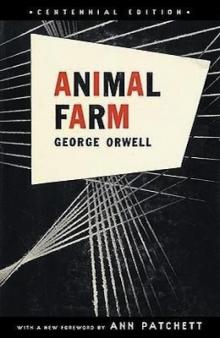 Animal Farm & 1984
Animal Farm & 1984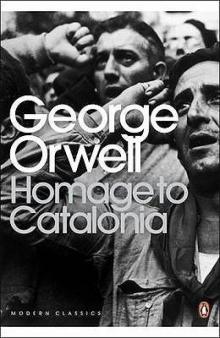 Homage to Catalonia
Homage to Catalonia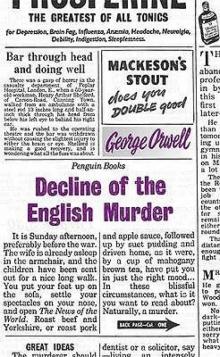 Decline of the English Murder
Decline of the English Murder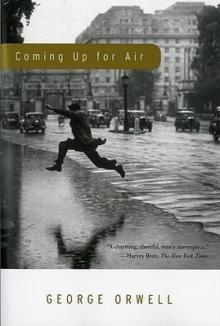 Coming Up for Air
Coming Up for Air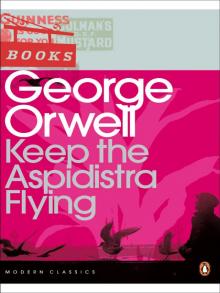 Keep the Aspidistra Flying
Keep the Aspidistra Flying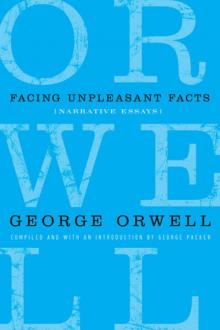 Facing Unpleasant Facts: Narrative Essays
Facing Unpleasant Facts: Narrative Essays The Complete Novels of George Orwell
The Complete Novels of George Orwell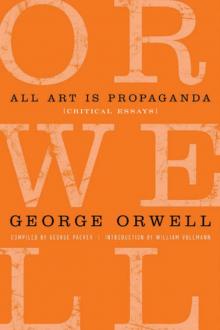 All Art Is Propaganda: Critical Essays
All Art Is Propaganda: Critical Essays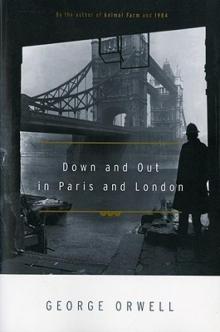 Down and Out in Paris and London
Down and Out in Paris and London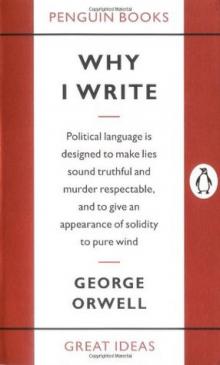 Why I Write
Why I Write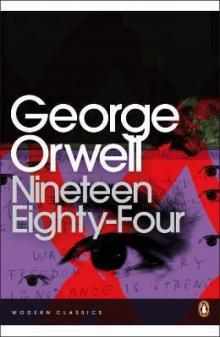 Nineteen Eighty-Four
Nineteen Eighty-Four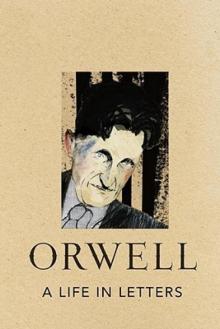 A Life in Letters
A Life in Letters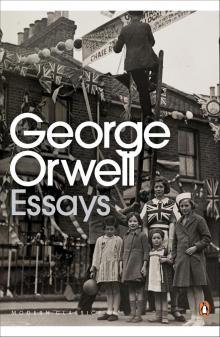 Essays
Essays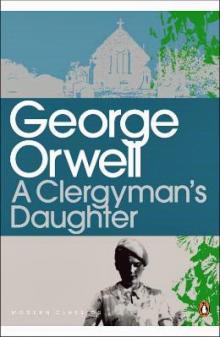 A Clergyman's Daughter
A Clergyman's Daughter Fifty Orwell Essays
Fifty Orwell Essays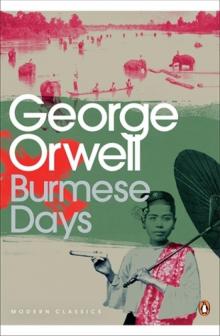 Burmese Days
Burmese Days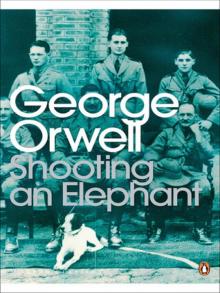 Shooting an Elephant
Shooting an Elephant 1984 (Penguin)
1984 (Penguin)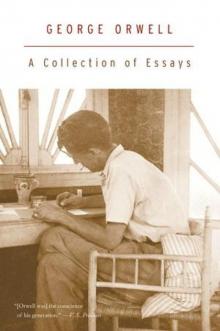 A Collection of Essays
A Collection of Essays 1984
1984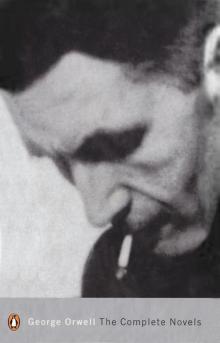 The Complete Novels
The Complete Novels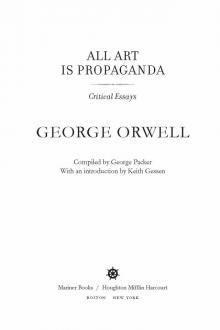 All Art Is Propaganda
All Art Is Propaganda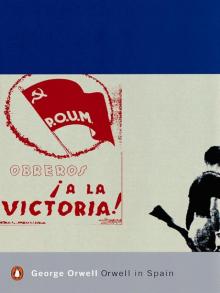 Orwell in Spain
Orwell in Spain Animal Farm: A Fairy Story
Animal Farm: A Fairy Story Animal Farm and 1984
Animal Farm and 1984